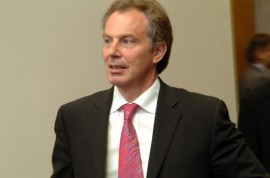
Tony Blair’s speech to the Australian parliament earlier today deserves reading. (You can read it here.) It got most attention in the press for its remarks about anti-American feeling in Europe (“madness”) but I am more interested in what he said about the battle of values.
“Ranged against us are the people who hate us; but beyond them are many more who don’t hate us but question our motives, our good faith, our even-handedness, who could support our values but believe we support them selectively.”
And that’s right. There’s a lot of hypocrisy and double standards waged in the so-called war on terror. The defence of human rights that involves Guantanamo Bay. The freedom in Afghanistan that does not include the freedom to convert to Christianity. The government clamming up on the rendition flights through British airspace. I’m not sure this is what we fought for.
But the important point is to reflect on what else can be done. Sacrifices have to be made sometimes in the name of a greater good, and any military operation will inevitably have some adverse consequences, but how to tell the difference between sacrifices made in the name of a greater good and sacrifices made of any other reason? That’s the problem.
Tony Blair has simply left himself unable to establish unambiguously his motives and purposes. He can only ask us to trust him. And that’s quite hard these days.
The founders of federalism understood this problem and sought to solve it through the creation of shared institutions under the rule of law. Public confidence should be based not on the individual judgement of transient political leaders (and they are all transient, whatever else they might like to have us believe) but on lasting institutions, acting in a transparent and accountable manner.
The World Trade Organisation cements progress towards free markets, for example, making it harder to slip back into protectionism again. The European Commission polices competition policy within the EU; the Court of Justice holds national governments to account for implementing the decisions they have taken in the Council of Ministers. The success of the WTO and the even greater success of the EU arise because of the institutions and law upon which they are founded.
In Blair’s speech, though, he is silent on the subject. The only reference to his belief in the rule of law is to say that other people don’t trust him on the subject. And rather than institutions, he talks in terms of a “global alliance”. Well, the notion of a global alliance is exactly the problem. Far better to have institutions in which everyone can participate on an equal basis.
Tony Blair’s approach to government has consistently valued ends and disparaged means. By doing so, though, he has forfeited public trust, both at home and – as he now acknowledges – abroad.
Jean Monnet understood the importance of institutions: “Rien n’est possible sans les hommes, rien n’est durable sans les institutions”. That lesson remains true today.
